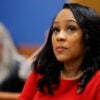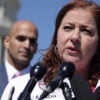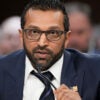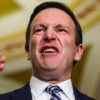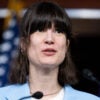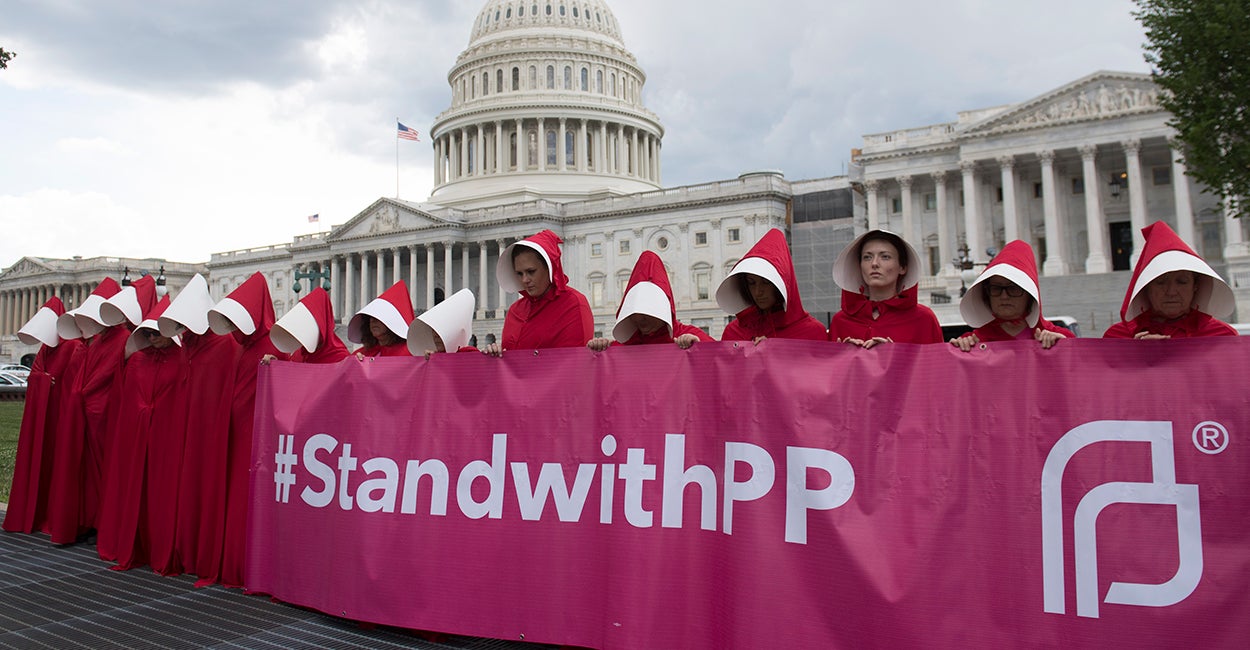Planned Parenthood is a business. Simply put, America’s largest abortion provider loses profit if young people are not having sex.
Monica Cline worked as a “comprehensive sex educator” and volunteer for Planned Parenthood for a decade before walking away to become a specialist in avoiding sexual risk and start an organization called It Takes a Family.
Cline joins “Problematic Women” to share the truth about sex education and why Planned Parenthood is working actively to break down communication between parents and their children.
The Daily Signal depends on the support of readers like you. Donate now
Also on today’s show, Rachel del Guidice, The Daily Signal’s congressional reporter, joins us to talk about flying on Air Force Two with Vice President Mike Pence. Del Guidice also discusses the brand new Daily Signal documentary she helped to produce, which is about a French teacher fired for inadvertently calling a transgender student “she” against the student’s wishes.
Plus, we give a quick update on the battle over women’s sports amid the transgender movement. And as always, we’ll be crowning our Problematic Woman of the Week.
Listen in the podcast below or read the lightly edited transcript.
Lauren Evans: Monica Cline worked as a volunteer “comprehensive sex educator” for Planned Parenthood for 10 years before walking away to become a sexual-risk avoidance specialist and start an organization called It Takes a Family. Monica has stood on both sides of the sex education debate, and she joins us today to give us an inside look into how sex education affects young people.
Monica, welcome to the show.
Monica Cline: Hi, there. Thanks for having me.
Evans: You spent 10 years working with Planned Parenthood. How did you become a comprehensive sex educator and come to work so closely with Planned Parenthood?
Cline: Well, that’s an interesting story. I was a student at the University of Texas at Austin. It was in the ’90s. HIV was something that everyone was really concerned about. And I was actually volunteering, or in a social work class, and I needed to volunteer for an organization.
And I had already worked in children’s shelters and done several things in the community. And I really wanted to do something different. And I was drawn to HIV because I had an uncle who identified with same-sex attraction. And I’m from a really small town in South Texas, and it wasn’t, his lifestyle was not something that was accepted in our area and in the family.
We loved him dearly, but he decided to move to California, where he felt like he could live his lifestyle as a gay man.
And so I only knew him via the phone, and so he would call, and we would talk to him. And it was in the ’80s that he came back to Texas to visit with us. And I understood it was because he was dying. And it turns out that he had become infected with HIV. And at that time in the ’80s, it was pretty much a death sentence, really.
Doctors were even prescribing medications to these men to take their own lives because there really wasn’t another option. And that’s what, later on, when I became an HIV prevention outreach worker at a gay organization, is when I discovered that’s really what my uncle had done, is he had taken his own life after visiting with us. And that was really the reason why I decided to volunteer at a gay organization.
They were doing HIV outreach. And I thought, “Maybe this is a way for me to get to know a little bit more about my uncle’s culture and what his life was like,” and I did.
I learned quite a bit. I was at that organization for five years. It was [the Austin Latina/Latino Lesbian, Gay, Bisexual, and Transgender Organization], and that’s where I learned that my uncle, who seemed to have a very timely death on the beach at sunset, I realized had taken his own life because that was really his only choice at that time.
And so, really, I was driven by compassion. I really wanted to help the community. I wanted to be there for people who were marginalized, who felt alone, and that was the reason why I decided to do that. And I was quickly hired after volunteering for just a few months. I graduated, and they quickly hired me.
And within a few months they said, “You need to go across the street to Planned Parenthood.” They literally were just across the street.
And they said, “The director of sex education there would like to mentor you, so that you understand how to share this message with school-aged children.” So I went over to the clinic, and she sat me down for a private mentoring. Sorry about that.
And she began to explain to me all of the horrible stories of girls as young as 10 coming into the clinic, and really, these were stories of young girls with [sexually transmitted diseases], or getting abortions, and in some even more severe cases, having objects removed from their bodies.
And they were just little girls, and so my first reaction was to say, “OK, you’ve convinced me. This is really terrible. Teach me how to teach these girls not to have sex.”
And she said, “No, dear.” And she patted me on the knee. She said, “We’re not here to teach them not to have sex. We’re here to teach them how to do it safer. It would be judging for us to go against their choice, and so, we’re just going to teach them how to do it safer by using condoms, lubrication, how to get tested and treated for STDs and have abortions.”
And I kind of was like, “No, these are just little girls.” But she assured me, as the expert who was receiving government funding, that this was the best way and the most compassionate way to meet these young girls where they were at. And so I believed her. I believed that this was it.
And so, one of the first lessons she taught me, she said, “OK, when you walk into a class full of children, you need to know that they’ve done anything and everything when it comes to sex. And if they haven’t, they will. And it’s your job to teach them everything about every sexual activity and how to reduce their risks through the use of condoms and lubrication.”
So, it really did mean that regardless of whether those children were sexually active or not, the job of the comprehensive sex educator is to introduce them to every possible sexual activity, whether it’s multiple partners at once, whether it’s the use of sex toys, whatever it may be.
The comprehensive sex educator needs to have an answer on how to help these people reduce their risk. And it doesn’t matter how old they are.
Virginia Allen: So, can you go a little further into that and explain? Are you spending an hour giving this presentation? Is this over multiple weeks? And what is the reaction you’re getting from students as you’re standing in front of a classroom? And I mean, is that boys and girls in the classroom? How old are these kids?
Cline: Right. So, this was in 1996. So, back then, we were not allowed to have curricula like you see today, where in California, or in Texas, where it’s several weeks of teaching. This was a one-hour class. We were snuck into the schools, or we would be at a juvenile detention center, or a halfway house, or even on the street, just meeting them in their neighborhood.
And the first thing that she taught me to do is that, even though she said that these [were] children, she was trying to convince me that they were all sexually active. She said, “They’re not going to tell you what they’re doing. And so it’s your job to break down their inhibitions, basically.”
And so boys and girls, one of the first, I guess what we call an icebreaker, is to have them list or shout out the names of all the sexual parts, whether it’s slang or accurate terms.
And the kids start to say different crass words for body parts. And the instructor is then writing them on a whiteboard. And by the end of that activity, even the shy kids are starting to shout out different words for different body parts, and they’re giggling, and they’re laughing, because they realize that the authority or the adult in the room is encouraging them to do it.
And so, that’s the first step in reducing their inhibitions and normalizing talking about sexual things with each other and with another adult. And so what’s left at the end of that activity is just a collage of dehumanizing terms for their bodies.
And so, that’s really not only the first time that they begin to break down their inhibitions, but it’s the first step to looking at themselves and each other as material things, or they begin to dehumanize one another.
Evans: Wow. So, what point are you like, “I need to get out of this”?
Cline: Unfortunately, it took a while. I wasn’t comfortable at first with talking to children. A lot of my work were adults and [intravenous] drug users and prostitutes. And my job was literally to walk in high-risk neighborhoods and areas.
And so, but when I was with kids, it was a little different for me. But I trusted them, and I did provide these lessons, including condom-negotiation skills and role-playing, and how to eroticize the use of condoms to basically persuade a sexual partner to use those condoms.
But … really the turning point for me was, I was actually invited by Planned Parenthood. We collaborated with each other, so I was never employed by Planned Parenthood. They trained me. They mentored me. And in the world of prevention, comprehensive sex education, HIV organizations, STD clinics and outreach workers, and Planned Parenthood all work together.
And so, we’re at fairs together. We’re sharing workshops with one another. In this situation, Planned Parenthood was asked to go speak at an alternative school to 13- and 14-year-old boys and girls. They didn’t have time, so they called me and asked me to do it.
So, I went to this alternative school, which is really for kids who are high-risk. They’ve been kicked out of every school, and this is kind of like the last school that they can go to. So these are high-risk children. They’re about 13, 14 years of age, and I had both boys and girls in the classroom.
And I started off the prevention message like usual. I wrote on the whiteboard, anal sex, oral sex, vaginal sex. And on the other side, I wrote blood, vaginal secretions, and semen. And that’s how we started the conversation, is to start talking about prevention.
And so as I’m talking, a 13-year-old girl in the back raises her hand, and she says, and I’m going to clean up her language just a little bit for us, but it’s probably still going to shock you.
And she was not being disrespectful. This was an honest question that she had. But she said, “When I give boys oral sex, I gag. Can you teach me how to do it better?”
And that actually did surprise me. So, I heard a lot, and I heard a lot from adults, but to see a little girl asking that question was still shocking for me.
So, I just restated the question to her, to make sure I understood her correctly. And I said, “OK, so when you’re involved in this activity, you gag. You don’t like it. You don’t like that feeling.” And she said, “That’s right. I don’t like it. But if you teach me how to do it better, maybe I will like it.”
And I said, “Well, have you ever considered just not doing the activity that you don’t like?” And at that point, she and the rest of the kids turned in their chairs and just looked at me. And Planned Parenthood had taught me that if I ever talked about abstinence, that they would feel judged, that the children would feel judged by that. But these kids didn’t look judged.
They just kind of looked really innocent like, “What are you talking about?” And I said, “Guys, do you realize you don’t have to have sex?” And I pointed to the board. I said, “You don’t have to have oral sex, or vaginal sex, or anal sex. And if you don’t, you never have to come in contact with someone else’s body fluids.”
And I pointed on the board again at the bodily fluids that transmit STDs and HIV. And they just were quiet.
And the little girl, the same little girl, raised her hand. And she said, “Ma’am, no one has ever told us that.” And they started to talk about abstinence. Now, they didn’t use the word abstinence, but they started to talk about ways that they could be with each other without touching one another, without having sex.
And they came up with great ideas like they … [the] majority of them lived in government [subsidized] housing. And at the time, most of them lived at Booker T. Washington. And they said, “Hey, the community center has free movies and free snacks. We could always just watch movies and eat some snacks.”
One of the boys said, “We can go to the park and just play basketball.” And the same little girl who asked about oral sex, she said, “You know, I’m really good at basketball, and I will beat you.” And he said, he’s like, “Yeah. I know. But it still would be fun.” And they just laughed, and they continued to talk to each other about ways they can avoid sex.
At that point, another little girl got up, and she came to the front of the class and whispered to me, and said, “I can’t do what they’re doing, right?” And I said, “Well, what do you mean?” She said, “Well, I’m already having sex. And everyone expects me to do it, so I can’t say ‘no’ anymore.”
And I said, “No. That’s not true. You have the right to say ‘no.’ And no one has the right to tell you otherwise. And if you decide never to have sex until you get married, you have the right to do that.” And she smiled so brightly, and went back to the group to continue talking about abstinence.
Now, here I was, a comprehensive sex educator, and I thought, “Uh-oh. I just did the wrong thing, supposedly.” I mean, these kids are now talking about abstinence, and I’m supposed to be teaching them about prevention or reducing the risk. But they were happy, and it really struck me that no one, not their parents, not their teachers, not any nurses, and certainly not the outreach workers in their neighborhoods, ever told them that they didn’t have to be sexually active.
Allen: And why do you think that is? I mean, it seems so basic, like such a basic concept to empower a young person, whether you’re conservative or liberal, with just kind of that simple truth of, if you don’t want to have sex, you don’t have to. Why is no one saying that?
Cline: I think there’s a couple of reasons. I think No. 1, there is a huge move to normalize childhood sex. So, everything that you see out there is teens are going to have sex anyway. They’re having sex whether you like it or not, and so there’s just this pervasive message, or even marketing strategy or branding, that is convincing even conservative families that their children are going to be sexually active anyway, that they can’t stop it.
I think the other thing, though, is in these particular communities, they were very high-risk communities. And so, these were the same kids whose mothers may have … There is a lot of women with children at the government housing who we knew were prostitutes. And we would literally drop off bags of condoms at their home.
And so part of it was that in that particular culture, a very high-risk culture, it was very normal. But it’s not to say … The truth is that once I got out of everything, I look back even today and I think, “Well, who is in those neighborhoods teaching something different, teaching abstinence, teaching about healthy families?”
Nobody. We were literally paid by the government through government funds to walk the streets every day. That was my full-time job, to literally walk the streets every single day, not in the office, but in those neighborhoods, every beauty shop, barbershop, every business, every door, every door of the government housing.
I was everywhere, and so were the other outreach workers. But no one is doing that same thing with the message of sexual-risk avoidance or family formation. There is no consistent person doing that, or organization doing that.
Allen: So, you spoke at The Heritage Foundation last week. And in your presentation, and you referred to it just briefly today, but you essentially described the sex education program of Planned Parenthood and similar organizations as a marketing tool.
Explain what you mean by that.
Cline: So, what’s important is that there is a goal that they have in mind. That goal is to sexualize children and make them lifelong customers of Planned Parenthood.
So, by providing sex education, they are now encouraging children to dehumanize themselves and each other, making them sexually active at a young age, normalizing every sexual behavior, including … Like I said, they normalize everything.
I don’t know how much I can say on the radio, but everything that you can imagine. I mean, it would shock you. You can purchase a book called “Scarleteen” and see all the things that are being normalized, that most adults probably don’t even know about.
But by doing that, those children now become dependent on getting condoms and contraceptives and getting tested and getting treated, and yes, even getting abortions.
And so, once that dependency occurs, and the parent who is purposely left out of the picture, there’s no one else who’s really guiding those children. And so, they become these customers, and they’re completely dependent on Planned Parenthood for those services.
And Planned Parenthood does a great job with, and I don’t mean to use the word great as in it’s a good thing, but they’re very well-versed in client-centered counseling skills. They’re very good at putting people at ease.
They’re very good at convincing children that this is … They will empathize with them and say, “Oh, yeah. Your mom and dad would probably be really mad to know you’re sexually active. But we know it’s perfectly normal, and we’re here to help you. And we can do whatever we need to, to make sure that you’re getting the services you need and keep and stay safe.”
And it sounds so positive. But really what they’re doing is creating a barrier between a family and their child, the guidance of a parent. They’re eliminating that completely and convincing these children that they’re on their side. All the while, they’re just leading them into high-risk behaviors.
Evans: So, speaking of the parents, when you went to that school and wrote those things on the board, I mean, did Planned Parenthood have any parental consent or any parental input for that curriculum?
Cline: Absolutely not. No. No, not at all. And at that time, we weren’t … And even today, unless they have permission, they’re not really supposed to be in the schools either, unless you’re invited.
And in many cases, other teachers or administrators will sneak them in. And that’s exactly what they did with me, as we were snuck into the schools. Or there may be a teacher. I know there was one teacher at this one particular school, who had her class in a portable building, and so it was really easy for me to just drive straight to that portable building and go into her classroom and teach children about sex, and no one knew about it.
So, there is no parent input, absolutely not. Parents, one of the things that I learned from Planned Parenthood is that, this is a quote from them, “Is that parents are a barrier to service?”—to their services.
They know that as soon as a parent is involved in their child’s life, or as soon as a parent knows that their child is going to a Planned Parenthood, Planned Parenthood won’t see that child again, because the parent’s going to keep them from there.
So, they do everything that they can to ensure that the parent is not part of the picture. And there’s a lot of sympathetic teachers and administrators who will help Planned Parenthood and other comprehensive sex education organizations to do just that.
But as you also know, they’re not … I mean, they’re very aggressive. They mean business, because it is a business to them. So, they don’t want to just sneak around anymore, as you’re seeing in California and in many states.
They’re becoming part, they’re influencing the local government. They’re influencing school boards. They’re creating mandates in the state education standards, and they’re working on the state and federal level as well, because their goal is to mandate this sex education, which is really an ideology, and change the sexual attitudes of our whole nation by influencing the children.
And they’re very effective, especially with their bullying tactics and with everyone wanting to be woke or politically correct, or they don’t want to be canceled, all of these words. But we need to stand up for children because they truly are suffering.
And my work with the teens, even back then, is that they’re waiting for leadership. They’re waiting for their parents to lead. They’re waiting to be given permission to abstain. And they need a parent’s help to do that.
Allen: So Monica, if my child is in public school, should I assume that they’re getting this kind of sex education? And how young is this starting?
Cline: Well, they believe that children are sexual from birth. And they use a little bit of truth, and then distort it completely. And just because we’re born with sexual parts doesn’t mean that we should be sexually active.
But according to Planned Parenthood and The Future of Sex Education, they believe in the sexual rights of children. They do believe that children at any age, even infancy, have the right to sexual pleasure. You can read that in their own mission statements. You can go to their websites and learn that.
They’re not hiding it anymore. And they believe it’s normal, and so they’re really trying to change the sexual attitudes of a whole nation and across the globe that this is true.
And so, you’re going to see that they are now creating programs for parents, to start convincing parents that their children are sexual beings, and that they should be able to learn about their bodies and pleasure themselves, or with other children. It’s really bizarre.
And then as far as public school, it’s starting as young as pre-K by introducing them to various lifestyles, introducing them to helping them understand that same-sex couples can be intimate with one another, introducing gender identity.
Really, they’re introducing moral … They’re doing away with moral absolutes and biological absolutes, so none of it is even based on any real research or reality, other than it’s what they feel and it’s what they want.
They also use a lot of Alfred Kinsey’s research, which is incredibly unethical and should have been illegal. But yet, Alfred Kinsey has influenced public health education and has influenced our laws in this nation as well.
So, working at the gay organization and collaborating with Planned Parenthood all those years, Kinsey is known as a hero. Margaret Sanger is a hero. Kinsey, they consider him a hero because he loosened the belt of people, of sexual repression, and gave people the spectrum of being from homosexual to straight and everything in between.
And now they’re using that same “spectrum” for gender identity as well. So, I think parents need to be very concerned, because even if the curriculum is not in your school, I get phone calls from parents all over the country that progressive teachers are teaching their children this in their class, even if it’s history, or whatever it may be.
Actually, right after The Heritage Foundation presentation, I received an email from a mother that was listening in. And she asked, “What do I do? My daughter’s teacher told her that having sex at this age is not a big deal, and she can totally do it.” And so now the daughter has come home and told her mother, “You’re worrying about nothing. My teacher said it’s OK to have sex.”
Evans: Wow. So, my question is: Why? What is their motivating factor to teach children this?
Cline: A big piece of this, which for some people, it’s something I think [is] hard for them to understand, is that there is a huge movement through socialism that really wants to do away with the nuclear family. They want to do away with anything that is of, whether it’s private property, or private family.
And so they believe that children do not necessarily belong to parents, but that they can educate the children in the way that they want them to go. And sex education is a big piece of that, because when you teach children to dehumanize themselves, to take intimacy and family and marriage out of sex, even to the point of killing your own children through abortion, you are essentially killing the family. You’re destroying the family.
And all of the tactics that they’re using—you can read any curriculum—not only is it going to be graphic, but they will not ever guide a child to talk to their own parent ever. You won’t hear a word about the parent. A parent is completely eliminated from this education.
They want the children dependent on the government, or on public health, whatever it may be, but they do not want the children to be depending on the parent anymore. And so, all of this really is to break down the family. And they’re essentially … we’re watching it happen.
Like I said, I receive a lot of phone calls from mothers who are admitting that their children no longer respect them, that they don’t think mom and dad … I mean, they basically have been given words in school. And they go home and they tell their parents, “You’re just old fashioned, or you are worshipping a god of hate, or you’re very conservative. You don’t understand the culture.”
And these kids are learning all this at school.
Allen: Monica, I just so appreciate your perspective because you’ve stood on both sides, really, of this aisle. You’ve seen the inside. You understand how this works. And you became a sexual-risk avoidance specialist. And you started an organization called It Takes a Family, really to shine a light on the truth about sexual education and the importance of parents actually being involved in that education.
Can you just explain a little bit about that transition for you, of then becoming a sexual-risk avoidance specialist, and a little bit about your organization as well?
Cline: Right. Well, I created It Takes a Family because of that quote from Planned Parenthood, that parents are a barrier to service. And I realized that was the key. Parents are the key. They’re the No. 1 obstacle between this agenda and children.
And parents are in the best position to lead their children, because children naturally love their parents. Children want to hear from their parents. At some point, and when I created It Takes a Family, my whole goal was to encourage and educate and equip parents about the culture and about sex, so that they can have these conversations with their children at home at their own pace and with their values.
And at some point, I asked my son, he was 17 at that time, I said, “I want to write this book for parents. What do you think? So they can talk to their children about sex. What do you recommend?”
Because he and I had a really good relationship, very open, talked about everything. And he said, “Mom, please don’t create a curriculum with videos.” I said, “Why not?” He said, “Because parents are just going to make us watch videos. And no kid really wants to watch a video with their parents.”
And I said, “Well, what do you recommend?” He said, “Well, teach them to do what you did with me.” And I said, “Well, what did I do with you?” He said, “You cared for me. You showed me. You let me know what your expectations are. You spoke to me from your heart.”
And that’s what kids really want. They want to hear from their parents. They want to hear their parents’ heart for them, and what their expectations are, and what they hope for them. And that’s what we want. We want a relationship.
And that really, one, it warmed my heart. But that is the key. The key is that when parents and children have confidence, when a child knows that their parent’s going to listen to them, no matter what the circumstance, no matter what the story, but that they have value in the eyes of their parents, that child will always come to the parent.
And that’s one of the things that I always shared with my son, because having the experience that I had watching these children who were afraid to speak to their parents, and instead were relying on a different adult, who was giving them very bad information, I realized it was important for my son to know that I was his greatest advocate and that I would always tell him the truth. And so I raised him that way.
If he wanted to talk about a pencil that he got as a prize in elementary school, and if he wanted to talk about it for 15 minutes, I listened because I knew that when if I could establish great communication with him, if I could establish a consistent habit that he knew “Mom always listens to me,” then I knew that when he became a teenager, he would have that confidence with me even then.
And so, that’s really what It Takes a Family is about—is not only do I want to educate parents on the realities of what is happening in the culture, they need to know the data on STDs. They need to know all those things. But most of all, they need to know how to have and establish a confident and trustworthy relationship with their children so that they can have those conversations with them.
Evans: Monica, that is such good advice. I choked up a little bit as you were telling that story. So, just thank you so much for what you’re doing and for joining us today.
Cline: Thank you for having me.

